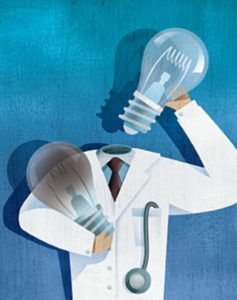 In perusing various blogs and websites concerned with issues affecting physicians, I recently re-read “Physician Burnout is Physician Abuse” by Dr. Pamela Wible, which I found on kevinmd.com.
In perusing various blogs and websites concerned with issues affecting physicians, I recently re-read “Physician Burnout is Physician Abuse” by Dr. Pamela Wible, which I found on kevinmd.com.
Physician burnout is prevalent throughout the U.S. healthcare system, as has been reported by multiple sources, with nearly half (46%) of physicians overall according to a recent survey by Medscape.
Dr. Wible purports that the term “physician burnout” implicitly blames the victims – the physicians – for a plight that is not of their own making, writing: “Physician burnout is a diagnosis that blames the victim, not the perpetrator. In fact, the term physician burnout IS physician abuse. It implies that you are to blame, not the system and perpetrators of the mistreatment.” She cites proposed remedies such as meditation and resiliency classes as evidence that individuals are being held responsible for managing symptoms that result from overwork and unreasonable demands.
I agree that physicians who are overworked, over stressed, disengaged, and downright despondent are not to blame for feeling the way they do. Physicians are under enormous pressure from myriad, and often conflicting, responsibilities and the vast majority of them are doing their level best to keep up and serve patients well. Their burnout is not self-inflicted.
Nor do I agree, however, that those who use the term “burnout” mean to suggest that physicians are at fault.
Having worked with dozens of healthcare executives and many hundreds of physicians on engagement issues, I can say with confidence that physician stress and burnout is seen as a serious, widespread, and systemic issue. Possibly my perspective is skewed because those organizations who seek out our services are already looking for ways to help their physicians. Healthcare executives are usually not in a position to reduce burnout with apparently obvious solutions, such as reducing patient load or relieving administrative duties, because they are themselves under enormous pressure to do more with less. Unable to offer a simple cure, they try to relieve the symptoms, using methods such as wellness classes and meditation training.
The complex conditions that cause physician burnout have long been in the making and no one is to blame –not healthcare executives and certainly not physicians themselves. No, physicians are not responsible for their own burnout. Which is not to say that they can’t be the ones to cure it.
Physician burnout is caused by systemic problems, starting with the way we train and educate medical students, fragmentation of care, too much focus on volume, digitization, changes at individual institutions and in healthcare as a whole. But those problems can only be solved by those who understand healthcare best – the physicians. Physicians can in fact heal themselves by caring for themselves and each other, engaging, collaborating, and leading the way to systemic, organizational changes that improve patient care AND their own career satisfaction. Executives can best help them by providing true and sustainable practical leadership development. Leadership development that includes leading and caring for one’s self first, practicing empathy toward others, engaging others effectively, asking for help (as opposed to seeing it as a sign of weakness), and cultivating resilience by embracing change.
I agree whole heartedly with Dr. Wible when she tells physicians “You were born to be a healer, not a victim.” But I do not believe the problem will be solved by physicians moving from one organization to another, only to be “victimized” again. I believe that physicians are capable of healing more than their patients. They can also heal their organizations and our entire healthcare system. The true cure for physician burnout is physician leadership.
Further reading:
Physician burnout is prevalent throughout the U.S. healthcare system—experienced by nearly half (46%) of physicians, according to a recent study from Medscape.
Effective leadership can help to alleviate physician burnout, according to research from Mayo Clinic and published in the April 2015 issue of Mayo Clinic Proceedings.
“Physician Burnout is Physician Abuse” by Dr. Pamela Wible.


